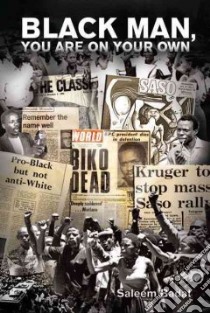Black Man, You Are on Your Own - 9781920222390
Un libro in lingua di Saleem Badat edito da Paul & Co Pub Consortium, 2010
- € 23.40
- Il prezzo è variabile in funzione del cambio della valuta d’origine
They refused to be defeated; instead they continued to live and work as fully as they dared, despite the legal constraints; testing, challenging Many of those who were banned were never idle. They generally defied the banning orders or continued the principle of testing the limits of the possibility.---Barney Pityana
SASO gave `to the ANC oxygen and new life, which the movement desperately needed -- youth of the South African people, tempered in defiance in action'.---Mongane Wally Serote
Some 40 years ago, in 1968, workers and students in France Book to the streets in battles against the conservative Gaullist regime. University students in Britain occupied campuses, calling for greater democracy and student rights. The Prague Spring saw Czechoslovakian patriots take on Soviet tanks in an attempt to overthrow Russian domination. In the United States, mass opposition to the war in Vietnam and the black civil rights and black power movements reached new heights. In South Africa, the South African Students' Organisation (SASO) was launched, under the leadership of Bantu Stephen Biko.
Black man, you are on your own analyses the ideology, politics and organisational features of Saso and their intellectual, political and social determinants. It also analyses the role played by Saso in the educational, political and social spheres and the factors that shaped its activities. Finally, it assesses Saso's contribution to the popular struggle against apartheid education and, race, class and gender oppression.
Black students were not just victims of apartheid but were also thinkers, conscious actors and historical agents. In the face of an authoritarian and repressive political order, Saso turned black students into an organised social force, taught them about politics and the role they should play, was a catalyst of collective action notably for the Soweto uprising, and contributed significantly to the erosion of the apartheid social order and to educational and social transformation in South Africa.
Informazioni bibliografiche
- Titolo del Libro in lingua: Black Man, You Are on Your Own
- Lingua: English
- Autore: Saleem Badat
- Editore: Paul & Co Pub Consortium
- Collana: Paul & Co Pub Consortium (Paperback)
- Data di Pubblicazione: 01 Marzo '10
- Genere: SOCIAL SCIENCE
- Argomenti : Students, Black South Africa Student movements South Africa
- Pagine: 156
- Dimensioni mm: 228 x 152 x 6
- ISBN-10: 1920222391
- EAN-13: 9781920222390


